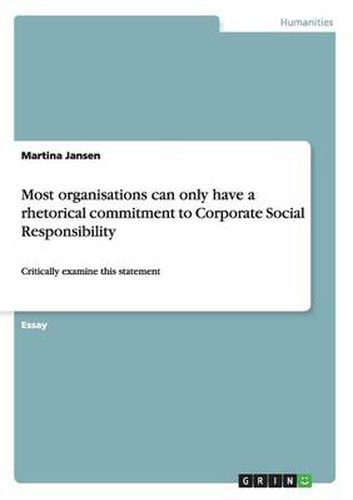Readings Newsletter
Become a Readings Member to make your shopping experience even easier.
Sign in or sign up for free!
You’re not far away from qualifying for FREE standard shipping within Australia
You’ve qualified for FREE standard shipping within Australia
The cart is loading…






Essay from the year 2009 in the subject Psychology - Work, Business, Organisational and Economic Psychology, grade: High Merit, European College of Business and Management (ECBM) London (London School of Economics and Political Science), language: English, abstract: [I]t remains a fact that many business leaders still only pay lip service to CSR, or are merely reacting to peer pressure by introducing it into their organisations. A smaller number have an inherent sense that it is ‘the right thing to do’ and feel committed to it. Fewer still are convinced about the business benefits and have embedded it throughout their organisations (Bevan et al. 2004:4) To shed light on the hypothesis that most organisations can only have a rhetorical commitment to Corporate Social Responsibility (CSR) and hence to further explore the above citation is the aim of this essay. In order to do so, the analysis is organized in three chapters: Firstly, three different, alternative perspectives on organizations’ responsibilities in general are examined, concluding that there is potential divergence on whether social aspects have to be considered as key elements for organizations. Secondly, the essay argues that some perspectives potentially conflict with the steep increase of CSR popularity during the past decades and defines real and rhetoric CSR commitment accordingly. Thirdly, rhetoric CSR as a gap between communication and implementation of CSR is decomposed into fixed and variable (economic cycle dependent) effects. The essay concludes with verifying the initial hypothesis especially for periods of economic downturns and emphasising the importance of further empirical research to better measure and fully grasp the implications of CSR nowadays.
$9.00 standard shipping within Australia
FREE standard shipping within Australia for orders over $100.00
Express & International shipping calculated at checkout
Essay from the year 2009 in the subject Psychology - Work, Business, Organisational and Economic Psychology, grade: High Merit, European College of Business and Management (ECBM) London (London School of Economics and Political Science), language: English, abstract: [I]t remains a fact that many business leaders still only pay lip service to CSR, or are merely reacting to peer pressure by introducing it into their organisations. A smaller number have an inherent sense that it is ‘the right thing to do’ and feel committed to it. Fewer still are convinced about the business benefits and have embedded it throughout their organisations (Bevan et al. 2004:4) To shed light on the hypothesis that most organisations can only have a rhetorical commitment to Corporate Social Responsibility (CSR) and hence to further explore the above citation is the aim of this essay. In order to do so, the analysis is organized in three chapters: Firstly, three different, alternative perspectives on organizations’ responsibilities in general are examined, concluding that there is potential divergence on whether social aspects have to be considered as key elements for organizations. Secondly, the essay argues that some perspectives potentially conflict with the steep increase of CSR popularity during the past decades and defines real and rhetoric CSR commitment accordingly. Thirdly, rhetoric CSR as a gap between communication and implementation of CSR is decomposed into fixed and variable (economic cycle dependent) effects. The essay concludes with verifying the initial hypothesis especially for periods of economic downturns and emphasising the importance of further empirical research to better measure and fully grasp the implications of CSR nowadays.